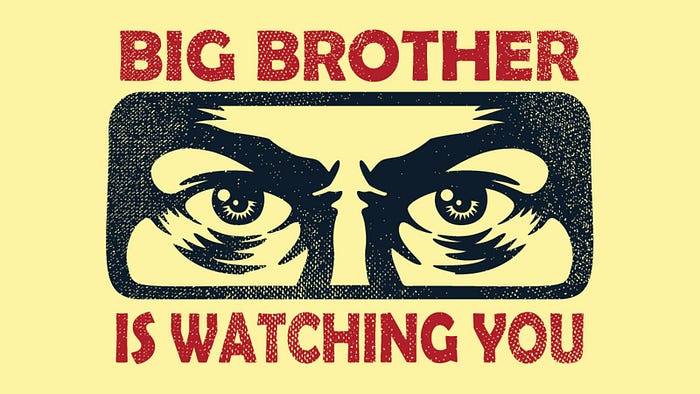Orwell was a socialist
Stop using his books to attack socialist policies
I’ve gotten into more than my fair share of internet debates. I have strong opinions about everything from superior voting systems (instant-runoff voting) to the right level of "doneness" for steaks (medium rare but on the rarer side; this is a hill I will die on). This means that I’ve spent hundreds of hours of my life re-typing the same arguments into Facebook comment sections.
And one particular argument that I consistently find myself getting sucked into is when someone posts a George Orwell quote to support an argument that Orwell himself would have strongly disagreed with. In particular, people often use quotes from his two most famous works—Animal Farm and Nineteen Eighty-Four—to argue against allegedly socialist policies, such as universal healthcare or free college education. This is more than a little bit ironic, considering that Orwell himself proudly identified himself as a socialist.
“Every line of serious work that I have written since 1936 has been written, directly or indirectly, against totalitarianism and for democratic socialism, as I understand it.”
— George Orwell
Many people are familiar with Orwell’s allegorical Animal Farm and dystopian Nineteen Eighty-Four, but few realize that the author was actually a devoted socialist. He fought alongside anarchists during the Spanish Civil War (first against the fascists and Francoists and then against the Soviet-backed Communists). While the idea that a self-proclaimed democratic socialist would first fight and then write against the Soviet regime might seem foreign to those with a narrow view of leftist ideology and ignorance of the Spanish Civil War, in reality there is a stark difference between the leftist policies Orwell advocated for and the authoritarian regime that ruled Eastern Europe.
Orwell actively identified as a democratic socialist, writing in an essay: “Every line of serious work that I have written since 1936 [Animal Farm and Nineteen Eighty-Four were written in 1945 and 1949 respectively] has been written, directly or indirectly, against totalitarianism and for Democratic Socialism, as I understand it.” He took pains to distinguish his own leftism from Soviet authoritarianism, viewing socialism as compatible with—perhaps even essential to—freedom, based on his experience in anarcho-syndicalist Catalonia. His experiences abroad, first in British-controlled colonial Burma and then in Catalonia during the war, helped to shape his anti-authoritarian but pro-socialist and anti-colonial point of view, which gets expressed quite openly in his famous fiction novels.

Many Americans’ first exposure to Animal Farm comes in their high school English classes. The book’s initial setting is a small farm, where animals are routinely oppressed by the farmer. In response to the farmer’s cruelty, the animals (led by the pigs) band together and overthrow him, taking control of the farm. The animals running the farm first adopt an egalitarian structure, but this system is gradually corrupted by the increasing gluttony and thirst for power of the leadership. This parable plainly mirrors the creation of the Soviet Union and the rise of Stalin’s oppressive regime.
[Orwell] strongly believed that it was possible to both have strongly leftist views and be critical of [a]… regime that claimed to espouse the same views.
The takeaway from this book for many people is that Orwell wrote it as an attack on socialism and the left. However, Orwell strongly repudiated this interpretation of his work. He explicitly wrote Animal Farm as a satire of the USSR at a time when Brits and Americans alike were largely supportive of the Soviet regime for its involvement in the Second World War. Orwell was disgusted by his countrymen’s apparent kowtowing to the Soviets, but at no point did he give up his leftist beliefs. The author strongly believed that it was possible to both have strongly leftist views and be critical of an autocratic and authoritarian regime that claimed to espouse the same views.
In fact, one of the often overlooked plot points of Animal Farm points to Orwell’s own propensity towards non-Soviet leftism. One of the pigs involved in the animal revolution, Snowball, is meant to represent Leon Trotsky, the Soviet revolutionary who lost a power struggle with Stalin and ended up exiled in Mexico. Trotsky became a symbol of anti-Stalinism and more broadly anti-Sovietism in the global leftist community, and his piggish counterpart is treated quite favorably in Animal Farm.

Nineteen Eighty-Four is probably more widely known than Animal Farm, though, paradoxically, it is almost certainly less widely read. Rather than an allegorical novella with whimsical farm animals being used to parody Stalin’s regime, Nineteen Eighty-Four has a broader anti-authoritarian message and harsher, dystopian imagery. Orwell’s final book describes an oppressive and authoritarian sci-fi future, filled with omnipresent government surveillance and propaganda, propped up by an unending and total war between three empires with indistinguishable ideologies. In the novel, Orwell coined terms such as “Big Brother” and “doublethink”, which have become mainstays in common discussions of authoritarianism in the 21st century.
…fear of a corrupted revolution did not prevent Orwell from supporting the ideal of socialism tempered by… love for freedom.
Nineteen Eighty-Four might, at first glance, seem like a warning against communism and revolution, much like how Animal Farm’s anti-Stalinism might be misinterpreted as anti-communism. In truth, the message of Nineteen Eighty-Four is more nuanced.
The ruling party of Oceania’s name is “Ingsoc”, an abbreviation for “English Socialism”, which to many suggests that Orwell was critical of socialism in England. However, Orwell had coined the term “English Socialism” in his wartime essay “The Lion and the Unicorn”, where he predicted that a distinctly libertine and English brand of socialism would inevitably emerge by the end of the Second World War. He was writing about Ingsoc as an example of the ever-present possibility of authoritarian perversion of a fundamentally egalitarian revolution, just like Napoleon perverted the animal revolution in Animal Farm and Stalin perverted the Bolshevik revolution in Russia. But that fear of a corrupted revolution did not prevent Orwell from supporting the ideal of socialism tempered by (in his view) the quintessentially English love for freedom.
Whether or not you agree with Orwell’s point of view, it’s important to understand the author’s views and intentions in writing. All too often, I see pundits and commentators (mostly on the right, but liberals and sometimes even leftists as well) reference Orwell’s work in an attempt to malign policies that he would have supported. While rhetorically effective because of the popularity of Animal Farm and Nineteen Eighty-Four, this misappropriation of literature is ignorant at best and actively dishonest at worst. Using Orwell’s work to oppose viewpoints that he fought and bled for isn’t just disrespectful to that author, it’s as good as spitting on his grave.
